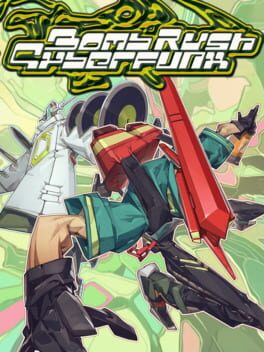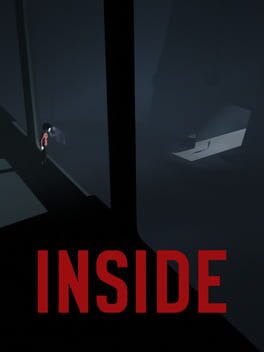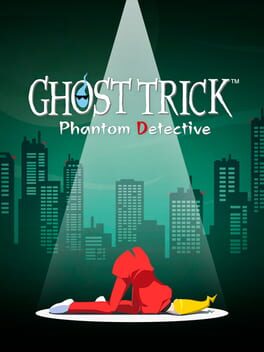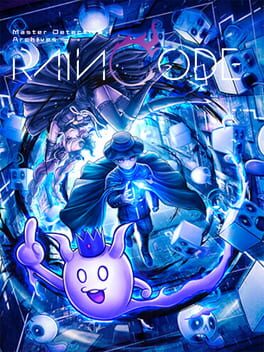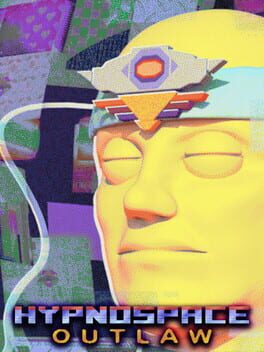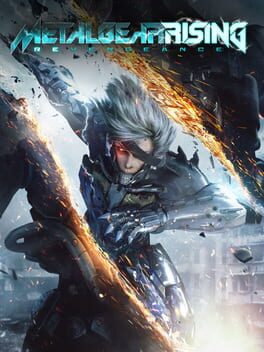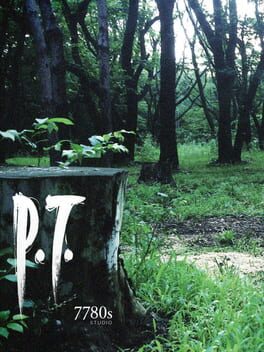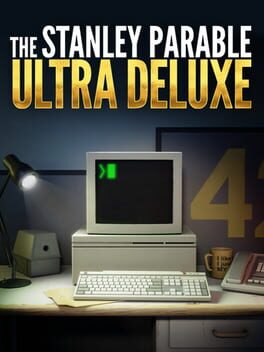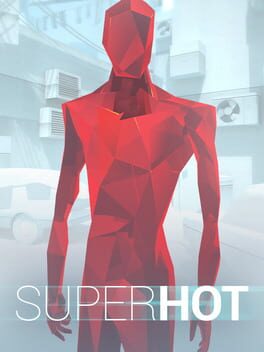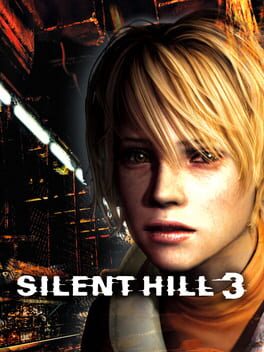jaedecell
2023
Let's say that I've had a contentious relationship with the Jet Set Radio franchise. I would argue that those games are the epitome of Style Over Substance, with phenomenal aesthetics and mostly great soundtracks; however, the gameplay itself always rubbed me the wrong way. In the original, it felt like a rough draft of a neat idea with it's rough controls and even rougher camera. In Future, they ironed out a lot of the controls, but there was just something with the level design and enemy encounters that I couldn't get past.
Bomb Rush Cyberfunk is a game which almost entirely overcomes all of those shortcomings it's influences fell victim to. The soundtrack is front to back amazing, the aesthetics are still great, the controls are tight as all hell, and the level design compliments it's more Tony Hawk Pro Skater style of combos perfectly.
There's just one issue for me: Combat. Any time I'm faced with an enemy who's counter strategy isn't just "maneuver up it's body and spray paint the weak spot" is a slog. These kind of games do not and have never needed traditional boss fights like the spider tank, in which you have to Super Mario Bros style hit a big guy three times. Moments like the aforementioned fight take away from the free movement the game focuses on for 85% of it's play time and it's a frustrating detour that doesn't add anything of value to the overall experience.
Those harsh words aside, Bomb Rush is a fantastic ride in spite of said shortcomings and, if Team Reptile decide to make a direct follow-up, I can only imagine it'll be one of the best games ever made.
Bomb Rush Cyberfunk is a game which almost entirely overcomes all of those shortcomings it's influences fell victim to. The soundtrack is front to back amazing, the aesthetics are still great, the controls are tight as all hell, and the level design compliments it's more Tony Hawk Pro Skater style of combos perfectly.
There's just one issue for me: Combat. Any time I'm faced with an enemy who's counter strategy isn't just "maneuver up it's body and spray paint the weak spot" is a slog. These kind of games do not and have never needed traditional boss fights like the spider tank, in which you have to Super Mario Bros style hit a big guy three times. Moments like the aforementioned fight take away from the free movement the game focuses on for 85% of it's play time and it's a frustrating detour that doesn't add anything of value to the overall experience.
Those harsh words aside, Bomb Rush is a fantastic ride in spite of said shortcomings and, if Team Reptile decide to make a direct follow-up, I can only imagine it'll be one of the best games ever made.
This review contains spoilers
Splitting this score straight down the middle just like J.J. does multiple times throughout the game.
"Good intentions" is the phrase that describes how I feel about basically the entire game, from the narrative to the gameplay. The puzzles/platforming mostly work fine, but, during the moments in which things get a bit more obtuse or demanding, I would get immensely frustrated. Also, the check pointing in this game is actually awful, like I felt like I was playing a game from the mid-2000s.
The narrative is a mixed bag as well for me. It's well-intentioned and I definitely understand the importance of having a Trans Narrative that doesn't shy away from the uglier parts of being a closeted trans woman, but there's parts of it where you can tell that it was absolutely written by a cis man. Particularly, as the story wraps up, it feels muddled on how Swery himself views the womanhood of J.J.. Emily creepily delivers dialogue about if we're just born to have sex, which feels like someone conflating gender-identity with sexual preferences, and vague platitudes about how "real" this is for J.J.. Upon returning to reality, J.J. gets a call from her mom where she ends the conversation by saying she loves her, despite the implication that her mom was actively trying to send her to a counselor specializing in "curing" queer youth. And it all ends off with the question of whether J.J. finally found who she was. It doesn't answer the question of who she was and, while I have nothing against an ambiguous ending, this feels like one of those few instances where it absolutely needed to answer that question to make all of the suffering that J.J. endures throughout the game worth it.
"Good intentions" is the phrase that describes how I feel about basically the entire game, from the narrative to the gameplay. The puzzles/platforming mostly work fine, but, during the moments in which things get a bit more obtuse or demanding, I would get immensely frustrated. Also, the check pointing in this game is actually awful, like I felt like I was playing a game from the mid-2000s.
The narrative is a mixed bag as well for me. It's well-intentioned and I definitely understand the importance of having a Trans Narrative that doesn't shy away from the uglier parts of being a closeted trans woman, but there's parts of it where you can tell that it was absolutely written by a cis man. Particularly, as the story wraps up, it feels muddled on how Swery himself views the womanhood of J.J.. Emily creepily delivers dialogue about if we're just born to have sex, which feels like someone conflating gender-identity with sexual preferences, and vague platitudes about how "real" this is for J.J.. Upon returning to reality, J.J. gets a call from her mom where she ends the conversation by saying she loves her, despite the implication that her mom was actively trying to send her to a counselor specializing in "curing" queer youth. And it all ends off with the question of whether J.J. finally found who she was. It doesn't answer the question of who she was and, while I have nothing against an ambiguous ending, this feels like one of those few instances where it absolutely needed to answer that question to make all of the suffering that J.J. endures throughout the game worth it.
2016
It was...good? Easily the best part of Inside as an experience is, much like Limbo, the atmosphere. The puzzles are decent except for the ones with the drowner, which allows me to segue into saying that the story really didn't do much for me. While the drowner bit is more of a bullshit Cinema Sins type nitpick about why it functions one way until it suddenlly doesn't, the overall story has a more dire issue in that it's just kind of boring. The allegory of humans being treated like farm animals in the factory of capital isn't a bad idea and there are some moments where the visual metaphor shines through, but it's just...not as impactful as I think the team wanted it to be. The soundtrack and atmosphere does it's damnedest to pull the rest of the game across the finish line, but it just doesn't quite get there.
Definitely my favorite Shu Takumi project I've ever played. The puzzles all hit that perfect balance of difficulty where you fumble with it for like 10 minutes before it finally clicks. The writing is PHENOMENAL, both from a character and plot standpoint, and the brisk pacing of it all only serves to highlight that quality. Frankly, I'm shocked that I had never been spoiled on anything from the game, but I think this is one of those cases where I was blessed by it being a cult classic that never quite got the recognition it deserved. However, this is an actual good mystery game that knows exactly how to drop feed all of the information you need to solve it by the time the game finally reveals, so I don't think getting spoiled on it would even ruin it. Probably have more to say about it, but I literally just finished it, so I gotta let that marinate. Check it out.
2019
as someone who had two false starts with this game over the course of about two years before finally playing it through proper, this game can kind of feel wildly intimidating to take the plunge on. every interaction feels like a potential hour lost to meticulously-crafted world-building and character writing. not necessarily a bad thing, but wildly daunting when you got a full-time and partner that you like spending time with. however, once you finally give in to the rich text laid out in front of you, it becomes one of the funniest, engaging, and emotionally resonant stories i've experienced. a great deal of life in a capitalist hellscape is spent mitigating pain, numbing ourselves just enough to do what needs to get done; however, the fact that we, a bunch of apes with screaming voices in our heads, have been able to even to do what we can in this existence is it's own bizarre miracle. and, even when we're gone, we continue to fuel a world that will live on long beyond our passing. be it spiritually, culturally, or materially. that's fucking disco, baby.
I'd probably like this game as much as any of the Danganronpa games if they had just cut out Chapter 3. Not because it's a bad case or anything; if anything, I think that it compliments the story by highlighting that even the resistance group that's ostensibly trying to improve the conditions of Kanai Ward isn't immune to the desperate want to escape it entirely and abandon their purpose. However, it's just that, more of a complimentary piece, as opposed to a key part of the story. The prologue and Chapter 1 are your standard set-up and tutorial case. Chapter 2 is your first proper case that has a solid emotional pay-off. Chapters 4 and 5 are your usual Kodaka Firing On All Cylinders closers. And then Chapter 3 is just kinda there and a bizarre lull in the difficulty curve. Like as soon as find out one specific clue during the investigation, the whole thing becomes an absolute cake walk. I'd argue that every case from that point on suffers from that same problem, but they at least have Kodaka being back on his bullshit throughout the course of them. Despite definitely having a lot of Danganronpa in it's DNA, I appreciate that Kodaka seems to be going more the path of the show he did scenario writing on before this, Akudama Drive. By finally slipping out of the realm of killing games, he's allowed himself to actually do world-building and explore his bread-and-butter themes in greater depth. It's one of those "there's a lot of potential here and I hope he gets to do another" kind of projects.
2019
There's such a sincere love for the particular era of Internet this game emulates that radiates through every single joke and level of irony that it's operating on. The moment in the final act where you find The Chowder Man's demo for One-Legged Friend, this stripped down miniature ballad about his fall from grace and desire to get back to where he was, is genuinely heartbreaking. And then you remember a couple hours ago where you found the Christmas Pain in Christmas Town music video and the absurdity hits you again and you're laughing through the tears. That's Hypnospace Outlaw.
People far more eloquent than me have written tens of thousands of words about both the politics of Metal Gear in general and specifically the politics of Rising. I don't wanna waste my time or yours trying to sound smart about geopolitical issues, so i'm just not gonna bother; however, goddamn if the early 2000s-ass aesthetic of this game doesn't so perfectly mesh with the final exclamation point of ripping out an American Senator's heart and crushing it like you're an anime character from an edgy 80s OVA. The nu-metal soundtrack captures this seething rage that I'd like to believe a lot of us feel towards a political landscape that we have little-to-no tangible power over. Somehow, by putting this project in the hands of Platinum, their bombastically stupid style of storytelling was able to make the politics of Metal Gear even more pointed that the rest of the franchise. Instead of more lofty, grandiose ideas, like "heroes are made by the times" or "genes, be them our DNA or the memetic kind, do not decide who we are as people", we get "the military industrial complex is a fucking nightmare that destroys nations and their people on a daily basis and the United States is kinda the main ones propagating it" in bold text across the screen. You can also give Raiden a poncho and sombrero and it's a good lock in combination with his cyborg stiletto heels.
2014
2022
the motherfuckers took that story about Hidetaka Miyazaki reading English-language fantasy novels, despite not understanding English, and just made a whole game out of the concept. truly a wonderfully enigmatic experience that's only really hampered by the difficulty spike when you hit the final act of the game.
"Don't cling to the legacy. Let it burn."
If there has ever been a quote that so tersely summarized the way that feel about the current media landscape, it is that. If the original Stanley Parable is Wreden poking fun at video game tropes, Ultra Deluxe is him taking the industry behind a shed and giving it the Ol Yeller treatment. Just an absolutely scathing indictment of endless reiteration and risk-adverse design-by-committee mindsets.
If there has ever been a quote that so tersely summarized the way that feel about the current media landscape, it is that. If the original Stanley Parable is Wreden poking fun at video game tropes, Ultra Deluxe is him taking the industry behind a shed and giving it the Ol Yeller treatment. Just an absolutely scathing indictment of endless reiteration and risk-adverse design-by-committee mindsets.
2016
Like the game practically shoves the concept of SUPERHOT being this deathly infectious experience down your throat to the point of it being a joke by the end, but, after 7 years of SUPERHOT sitting in my brain, I can confirm that they ain't wrong. SUPERHOT is still incredibly dope to play and look at, even if it's hamfisted to a massive fault.
2003
Everything about this game holds a special place in my heart. It was my first survival horror game. It was the first video game soundtrack I ever owned. It's the first video game I ever had the "GAMES ARE NEVER GOING TO LOOK BETTER THAN THIS" moment with. It was the first game I owned that I really shouldn't have been playing at my age, but my parents still bought it for me for some reason. Heather was the first video game protagonist that I saw myself in. Plus, it's just a great game on top of all the warm nostalgic feelings I have toward it.
2015
The most beautiful thing about this game to me is that it feels like you can't start talking about it without falling into the same spiraling levels of obfuscation that the fictional Davey Wreden character does. It effectively forces you to keep your mouth shut and just stew on everything you experienced much like Coda wished the fictional Davey had done with their games from the first place. Let art wash over you and, if you feel inspired, make something yourself. Even if you feel like an empty fucking failure by comparison.
